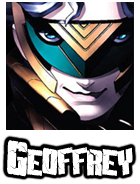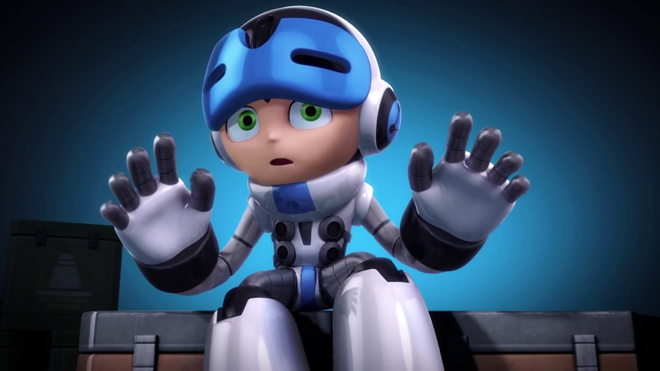I’m not sure if anybody sees The Game Awards as the end of the year for gaming, but these theoretical people really need to wait two more days instead. For here is the true and indispensable reckoning of gaming in 2023. You can trust me, I promise.
|

|
 |
 |
1. Square Enix live service armageddon
I think 2023 got the baby and the reaper confused, at least in Square Enix’s neck of the woods. Instead of starting the year with promise and growth, Square killed off or announced the killing off of almost all its live service games one after the other in the first five weeks of the year: Final Fantasy VII: The First Soldier, Marvel’s Avengers, Babylon’s fall, Bravely Default: Brilliant Lights, Chocobo GP, Dragon Quest: The Adventure of Dai… and that was all within the span of a few weeks.
It is the fate of all live services games to die. But even though the median lifespan of such games are much shorter than the isolated success stories, to have so many young games — some with heavy-duty IP — end all at once is a clear indication that Square Enix’s aim is very much off.
2. The Three Persona 3s
TL;DR: P3P rerelease underscored the need for a definitive edition of P3, Atlus announces P3 Reloaded which just forks the editions further.
It’s been a long, roller coaster of a year for the Persona series, so let’s recap the third game’s palace in it all. All the way back in January, a low quality port of Persona 3 Portable hit Steam and various other digital marketplaces after being trapped on the PSP (and I suppose any other device that can play PSP titles off the PSN) for 13 years. It left a lot of people wondering why it was a tepid example of a remaster and why there wasn’t finally a version of the game that combined the superior presentation and added content of Persona 3 FES with the gameplay improvements and the additional female protagonist story from Portable.
So when Persona 3 Reload was announced in June, it was only natural for people to think, “Hey, here’s that definitive edition of Persona 3 we’ve been waiting for.” It didn’t take long before Atlus popped that bubble by saying it was nothing more than beginning the original game up to Persona 5 standards in presentation and gameplay. Both “The Answer” from FES (which is important to the series’ overall plot) and the Female protagonist and her story from Portable (which isn’t, but I’m told is a lot of fantastic writing) are not included. Moreover, several new story additions and other original features are coming. As such, we have now gone from having to play two versions of Persona 3 to experience all the content to having to play THREE. Though some hold out a cynical hope that the missing pieces will be reincorporated later so Atlus can continue their proud tradition of selling you mainline Persona games twice.
3. Unity diaspora
In an unforced error reminiscent of what Wizards of the Coast tried to do with the Open Game License (and we’ll get to that later), Unity decided to destroy its business by attempting to hold its customers hostage.
You might be shocked to hear that the customers didn’t take this lying down and raised such a stink that Unity backpedaled on the plan and its CEO, John Riccitiello (formerly of EA), “retired” shortly thereafter.
But that was surely cold comfort for all the game developers who woke up one morning only to find that they could no longer afford to sell their existing games, or even ones still under development due to Unity’s attempt to impose higher fees retroactively. At the time, several announced changing game engines for future projects as they can’t trust Unity anymore or simply because Unity doesn’t deserve their business for even trying such a stunt.
And with unity laying off and divesting their interest in special effects for movies and TV to focus on their “core” business, you have to wonder if the writing is on the wall for the company.
|
1. Nintendo learned to maintain a pipeline of games during a console’s End of Life
While there have been endless rumors of an enhanced Switch or an outright successor for a long time now (and we might actually have gotten away with a Switch “Pro” if it weren’t for you meddling pandemics), it wasn’t until this year that the whispers finally reached “credible” status. The only fly in the divination ointment, really, is that Nintendo hasn’t wound down their development of Switch games.
You see, Big N has tended to treat their outgoing systems harshly of late. While I’ll give them a pass on the Wii U, given they had to unexpectedly rush its successor, the fading days of the Wii still stand out as a shining example of dimness. Nintendo’s own output was next to nil, going so far as not even releasing the games they did have in its largest market.
Contrast that with now, when there’s a constant drip of first-party titles and the marketing train keeps on rolling for software in general. At a point in time when there were naught but crickets and tumbleweeds save for a cross-platform Zelda game in at least the past two generations, the Switch is still loud and proud. Nintendo’s still cranking that first-party machine with new entries for the Mario, Zelda, Pikmin, Detective Pikachu, WarioWare and Fire Emblem series. Remakes for games in the Famicom Wars, Kirby, Paper Mario, Mario v. Donkey Kong, Luigi’s Mansion, Baten Kaitos, Pikmin and Another Code series. Expansion packs for Mario Kart and Pokemon series. And even an original Princess Peach game. And I’ve probably missed some, too.
Long story short (too late?), the Switch is going to go out with the bang it deserves.
2. Finally feeling the love for Yakuza
The Yakuza series of games seemed like one of gaming’s best-kept secrets for a long time. It surfaced occasionally as stories about how an in-game character was modeled after a porn star (and you’d think that would have got things moving all by itself), or memes the larger Internet community didn’t get.
But now, sales are up. One of the games North America was missing, Like a Dragon: Ishin got a remaster and made its way overseas. And Sega feels it’s poised for more growth, investing in a pro wrestling sponsorship to hype this year’s other release, Like a Dragon Gaiden: The Man Who Erased His Name. It’s not as big as Sonic, for sure, but it really felt this year that Better Shenmue is starting to get its due beyond the franchise’s existing fans.
3. Microsoft spills every bean
If there’s one good thing that came out of the Activision/Microsoft merger process, it’s all the trade secrets that got spilled during the court cases.
The Discovery process in the lawsuits against the merger unleashed several delightful tidbits from Microsoft’s own planning and their industry research. From a design mockup of a cylindrical and digital-only Xbox Series X Pro to a dead-on prediction for the launch timing of the PS5 Slim to cancel projects and in-progress classic game remakes, to the costs involved in adding a game to Game Pass, there was a steady drop of insider tidbits the likes of which we usually only hear about from hacks.
But perhaps the most important piece is the all-too-rare indication that a gaming exec actually knows a thing or two about the industry. You can read Microsoft Gaming CEO Phil Spencer’s message in full here, but for better or for worse he demonstrates a clear understanding of the future of game distribution, AAA projects and publishing. And we should probably be keeping an eye on Xbox for hints on what future new normals in the industry will be.
|
|

|
 |
 |
1. Bad Gaming Industry Layoffs
Several elements of the tech industry have been “overcorrecting” for all
the hires they made during the pandemic, one in which profits were robust for them despite everything else being bad. Rather than lose any of their money for their own shortsighted mistakes, though, the higher-ups have decided that the lower employees must be punished. Far too many companies to name have shed staffers this year, the worst of them coming from Embracer Group. This has killed morale in several development studios, and whether other developers have enough position openings for them is uncertain. This was a great year for video game releases, but less talented staffers working at the studios themselves will have dire future consequences.
2. The New Konami Is Bombing So Far
Konami appeared to be nearly as “back” as Level-5, something mentioned in the “Nice” column, in 2022. But their valiant return is having a few stumbles, in unfortunately classic Konami faction. The first new Silent Hill effort, Silent Hill: Ascension, was so bad of a botch that it might have been better to leave the franchise dead. The Metal Gear Solid: Master Collection Vol. 1 displayed hardly any “mastery,” and was worse than the old HD collection from Bluepoint in some ways. There’s still time for them to right this ship, but my faith in that happening has unsurprisingly diminished.
3. Video Games Themselves Getting More Expensive
The start of this new console generation marked
the beginning of average AAA/AAAA(hhhhh) software prices increasing from $59.99 to $69.99, and equivalent prices around the world. This only worsened this year, with more publishers jumping in on the action. One key company among those was Nintendo, which introduced their first $69.99 title with The Legend of Zelda: Tears of the Kingdom, a current game for the current Switch. This was combined with the trend of video game hardware getting more expensive instead of cheaper over time. Keeping up with current gaming is only putting larger figurative gaping holes in the wallet.
4. The Game Awards 2023 Was a Letdown
The Game Awards this year came with solid announcements, the best for a Geoff Keighley-hosted show this year. But the show could have served a larger purpose and taken firm stands on the plight game developers are currently suffering from and the genocide in Gaza, as game developers and the young Future Class of developers asked the organizers to,
respectively. They did neither. The show only further emphasized game reveals and celebrities over the awards themselves. Not only did the show not acknowledge Gaza in any way, they also deleted their acknowledgement of Ukraine after Russia’s invasion from last year. It’s poor form, even if it wasn’t entirely surprising from this show’s team.
|
1. No Shortage of Great Games
Plenty of bad happened this year, inside and outside the video game industry, but let’s face it: There was a ridiculous wealth of great games released this year. They were constant throughout 2023, including the likes of Octopath Traveler 2, The Legend of Zelda: Tears of the Kingdom, Baldur’s Gate 3, Alan Wake 2, Street Fighter 6, Final Fantasy XVI, and too many more to name here before this entry merely consists of a list of them. There were plenty of great games for a variety of tastes, entirely too many for most to finish. But that’s what backlogs are for.
2. The Push to Digital Got Setbacks
Make no mistake that publishers and hardware manufacturers would still love to push the entire gaming community to the digital market over the physical one, and they’re largely still winning this fight. But it all received some setbacks this year, all of them entirely of the gaming industry’s own doing. Sony made the digital PlayStation 5 more unobtainable by raising the price of the slim Digital variant to $450 compared to the original hardware’s $400 price. When the price is that close to the disc-based model, it’s tough to bother with it. The topic of preservation has also
come up frequently enough that more games are getting physical releases. This isn’t enough to avert The Digital Future, but it’s a good step.
3. Level-5 Roars Back to Life
Level-5 was once a company brimming with life, particularly during the Nintendo DS and 3DS days. But they seemed lost in the wilderness after those consoles faded from existence, uncertain of how to move forward and what to do it with. It took a bit of time, and a prolonged pandemic didn’t help, but they appear to have figured this whole gaming thing out again with the announcements of games like DECAPOLICE, Fantasy Life i, and Professor Layton and the New World of Steam. It’s a shame they haven’t figured out how to avoid the crippling delays quite yet, but they’re getting back in the swing of it. Or something like that.
4. Sega’s Also Roaring Back
Let me be clear and say that Sega’s been largely fine. The company may not be releasing as many games as they were during their time in the hardware market or even during the PS2/Xbox/GameCube era shortly after their exit from it, but they still put out some quality stuff. Just in time for the Dreamcast’s Japanese anniversary, they’re tapping into their nostalgic selves by green lighting new projects in several franchises, including Golden Axe, Shinobi, Jet Set Radio, and Crazy Taxi. And they’re indicating that this is just the beginning for Sega’s rebirth, even though, again, they didn’t fully die.
|
|

|
 |
 |
1. Unity’s Disastrous Runtime Fee
In September Unity introduced a Runtime fee policy that would begin on January 1, 2024. The fee would have charged $0.20 per install of any game running the Unity Engine with more than 200,000 installs. Confusion broke out immediately. Would the fee have applied retroactively to games? Would the fee count toward people who installed and uninstalled their games multiple times? What charity bundles and GamePass? Did they count? Unity attempted to downplay the changes and to clarify the fee in order to put game developers at ease. It didn’t work. A number of developers stated they wouldn’t use Unity again for future projects unless this decision was reversed. Godot, a competing engine saw massive boosts in interest and sales. Eventually, Unity walked back a number of policies regarding Runtime, but did not completely reverse their decision. CEO John Riccitiello also retired after the fiasco.
2. Nintendo’s Harsh Punishments
Here’s your yearly reminder that Nintendo is fiercely protective of their intellectual property. 53-year-old Gary Bowser was released early from his three-year prison sentence for his role in Switch hack selling operation, Team Xecuter. His plea agreement will have him paying the gaming company $10 million in restitution. As much as 30% can be taken from his gross monthly income via wage garnishment. It’s a harsh punishment for a man in his fifties who’ll likely never pay off the debt before he dies.
In another case not quite as egregious as being ordered to pay millions in restitution, Nintendo filed numerous copyright strikes and claims against PointCrow, a YouTube modder’s channel. The crime? Releasing a free public multiplayer mod for The Legend of Zelda: Breath of the Wild. A cease and desist letter wasn’t enough, Nintendo also threatened the existence of his entire channel, regardless of his YouTube videos being fair use and falling within the company’s own guidelines.
3. Blizzard Cancels Overwatch 2’s Hero Mission PvE
In May, Overwatch 2 director Aaron Keller revealed the game would no longer have a PvE mode called Hero Missions. The original concept was based on allowing players to upgrade individual heroes with skill trees on story missions. This mode had been in development since 2016, but the Overwatch team wasn’t able to implement it into the sequel and ultimately decided to focus on a smaller scope for PvE. This would come in the form of Story Missions with the release of season 6. The news disappointed players who were looking forward to Hero Missions since the Overwatch 2 reveal in 2019. Others were angry because it felt like Activision Blizzard promised a game mode they didn’t even have fully working and strung players along for years. Personally, the scrapping of Hero Missions killed all of my interest in OW2.
4. Microsoft wins against the FTC, Purchases Activision Blizzard
Speaking of Activision Blizzard, Microsoft successfully acquired the large third-party game publisher in October for just under $69 billion. Said acquisition came well after a year of court battles with the FTC in the United States and the CMA in the United Kingdom. This means Microsoft now owns Call of Duty, Overwatch, World of Warcraft, Candy Crush Saga, and numerous other juggernaut gaming franchises. The tech giant made various concessions to regulators to close the deal on the purchase. This included a deal with Sony and Nintendo to keep Call of Duty games on those consoles for ten years. Even though the FTC has vowed to appeal, winning such a case feels like a long shot for the regulator. After that ten-year period is up, who knows how anticompetitive and/or anti-consumer Microsoft could become. We may not even have to wait a decade to find out.
5. Sony Behaving Badly on the PlayStation Network Front
It wouldn’t be any fun if I left Sony off my Naughty list this year. I have to round out my hat trick of writing about console makers being bad. Users received a harsh memorandum that in today’s digital media landscape nothing is forever. At the beginning of this month Sony announced that all Discovery content purchased via the PlayStation Store would be removed on December 31. This goes beyond not being able to just purchase numerous Discover TV shows. No, that media is being completely removed from users’ libraries despite them paying for it. Refunds also won’t be offered from Sony or Discovery. The clarification that purchased digital content is actually a license instead of a true purchase is deep within the terms of service, but it would be nice if companies were upfront about this. Essentially purchasing digital media is actually a long-term rental and not ownership. Worse yet, there are few licensing agreements immune to expiration dates. If you truly want to own the media buy it on disc or find other acquisition means.
In the same week, PSN users found that their accounts were permanently suspended by Sony without reason. Just as quickly as the suspensions came, many were reversed. Sony has yet to issue a statement about the incident.
|
1. ZeniMax Game Testers Form a Union
The United States has experienced one of the biggest pro-union movements in decades. The gaming industry is not immune to this pro-labor wave. In January, about 300 employees from ZeniMax Studios successfully formed a union with the Communications Workers of America to create ZeniMax Workers United. Microsoft promised to remain neutral during the voting period. This allowed the vast majority of game testers at ZeniMax to unionize — a stark contrast between how other tech companies have dealt with unionization attempts. Here’s to hoping this move paves the way for more unionization in the gaming industry.
2. Sega of America Employees Also Form a Union
Not to be outdone by ZeniMax, employees at Sega of America voted to unionize with CWA in July. While not the largest union, the Allied Employees Guild Improving Sega represents multiple departments opposed to just quality assurance testers at other video game unions. This move also makes AEGIS-CWA the fifth video game union in the United States. Unlike Microsoft, Sega has not voluntarily recognized the new union, but they have made it clear that unionized employees will not be treated any differently.
3. UK CMA Blocks the Microsoft Activision Deal (Not That it Matters)
After Microsoft sailed through regulator approvals with their Activision Blizzard acquisition, the FTC remained their biggest road block. Two months after the FTC sued to stop the purchase, the UK CMA blocked the deal. Their concerns weren’t over anticompetitive practices regarding game publishing, but over what it meant for cloud gaming. It was nice to see regulators stand up to media consolidation after decades of uninterrupted mergers. That said, this nice story has a bittersweet ending as the CMA folded shortly after the FTC lost its bid to block Microsoft’s purchase. The UK regulator worked out a deal where Microsoft would transfer its Activision Blizzard cloud gaming rights to Ubisoft for 15 years.
4. Activision Blizzard Will Finally be Free of Bobby Kotick
The biggest positive for the Microsoft Activision Blizzard purchase is the fact that Bobby Kotick will be out of the company at the end of this year. Granted, Kotick was kept onboard to help with the transition post-purchase. Sadly, he gets to leave with a golden parachute costing a cool $375 million. This in a company he helped make a little worse for employees each day since he became its CEO in 1991. Nevertheless, him being gone will hopefully make life slightly better for employees at Activision Blizzard. Let’s hope Kotick’s golden parachute has him landing in a place where he can no longer do harm.
5. 2023 Has Been a Great Year for Game Releases
From AAA studios to indie developers, there was truly something for everyone in 2023. Some of the biggest releases of the year included One Piece Odyssey, Fire Emblem Engage, Hi Fi Rush, Street Fighter 6, Final Fantasy XVI, Sea of Stars, The Legend of Zelda: Tears of the Kingdom, and Bomb Rush Cyberfunk. In terms of the highly anticipated Starfield, it was amazing to see how quickly Baldur’s Gate 3 stole its thunder. On a fascinating note, Drew played Persona 3: FES and Persona 4 Golden, and managed to avoid this year’s Persona 3 Portable and P4G ports to newer systems. That’s impressive timing. (Maybe not so much for Persona 3 Reload.)
|















